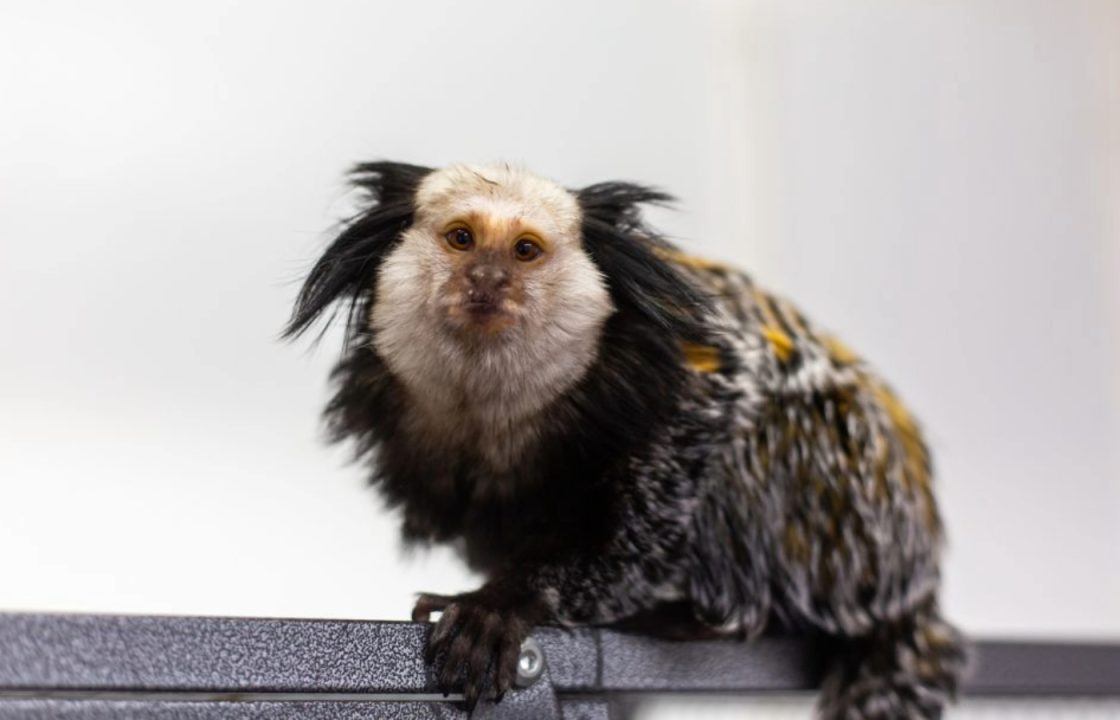A young monkey was rescued from a bird cage after being found “stressed” and with an “addiction to marshmallows”.
Scottish SPCA officers were called out after neighbours in East Lothian spotted a young marmoset in a large bird cage in a living room window in March.
The four-year-old monkey, named Steve, was found underweight and stressed out from constant handling.
Officers said he had developed an addiction to sugary marshmallows after being constantly fed them.
The SSPCA inspectors took Steve into their care, and after six weeks, he made a full recovery.
He has since been transferred to his home in a monkey sanctuary in England.
SSPCA shared the “harrowing” story as part of it’s campaign Don’t Pet Me in collaboration with Born Free and OneKind to raise awareness of the widespread trade in wild animals as pets in Scotland.
Scottish SPCA director of Strategic Communications & Partnership Engagement, Gilly Mendes Ferreira, said many people are unaware of the “growing and worrying trend” of keeping wild animal keeping in Scotland.
“Animals like Steve being bought and sold as novelty pets, often on impulse, with little understanding of the complex care they require,” she said.
She added that although the animals may look cute they are “anything but easy” to look after.
“Marmosets are highly intelligent, social primates that need space, stimulation, and the companionship of their own kind,” she said.
“No domestic setting, no matter how well-meaning, can truly meet those needs. Thankfully Steve’s story has a happy ending but not every animal will be so lucky.”
The charities joint research involved monitoring online sales of wild animals and visiting pet shops, plus commissioning research exploring the motivations, behaviours and experiences of people who keep wild animals at home.
It found that animals belonging to an estimated 300 different species were available to purchase online in Scotland over a 16-week period.
Results showed that hundreds of exotic species, including snakes, tortoises, birds, and exotic fish, are being bought and sold for private keeping, often with little oversight or regulation.
The study also found that up to 90% of marine tropical fish and 19% of reptiles and amphibians sold in pet shops are taken from the wild, raising welfare and conservation concerns.
Some species are bred for appearance rather than health, leading to genetic disorders that affect their welfare.
The charity is urging the Scottish Government to introduce a permitted list of animals that can be legally kept as pets as at present there are very few restrictions on what animals can be owned.
Born Free’s captivity research and policy manager, Chris Lewis said the campaign highlights the distressing number and variety of wild animals for sale in Scotland and the lack of regulatory oversight.
“This should be a major cause for concern for the Scottish Government, legislators, animal-lovers and the public in general,” he said.
“Worryingly, the data and stories of individual animals included in the report may only be the tip of the iceberg. The existing legislation is inappropriate and outdated, it is unable to keep up with ever changing trends and demand for wild animals as pets.”
He added: “Most tragically though it is failing to protect the animals sadly caught up in this trade.
“Something needs to change. In the lead up to the next Scottish election, Born Free is calling on all political parties in Scotland to commit to comprehensive changes to the laws around the buying, selling and keeping of wild animals as pets.”
OneKind’s director of Policy, Kirsty Jenkins, said the research the company commissioned painted a “deeply worrying picture” of how some animals are treated as commodities or collections.
“Such sad stories emerged, of animals being kept in tiny boxes, poor diets, social isolation, forced handling, accidents and deaths. Some species, particularly of reptiles, are thought to be stupid and unfeeling, and treated accordingly,” she said.
“It is difficult or impossible to meet the needs of many of these animals in captivity. African pygmy hedgehogs, for example, are popular because they are ‘cute’, yet these are wild animals who would naturally roam miles every night and often do not like being handled.”
She added: “The law is currently failing to protect these animals – that must change. We also want to encourage a more thoughtful approach to keeping ‘pets’ – one of companionship, and only when the animal can thrive.”
A Scottish Government spokesperson said: “We are committed to the highest standards of animal welfare and understand public health and conservation concerns around the keeping of exotic pets.
“We welcome the work of groups in dealing with the welfare problems caused by irresponsible owners and the campaign for raising awareness of this important issue.
“The Scottish Animal Welfare Commission has explored the issues surrounding the keeping of exotic pets and we will continue to consider the steps that could be taken in this area.”
Follow STV News on WhatsApp
Scan the QR code on your mobile device for all the latest news from around the country


 SSPCA
SSPCA
























